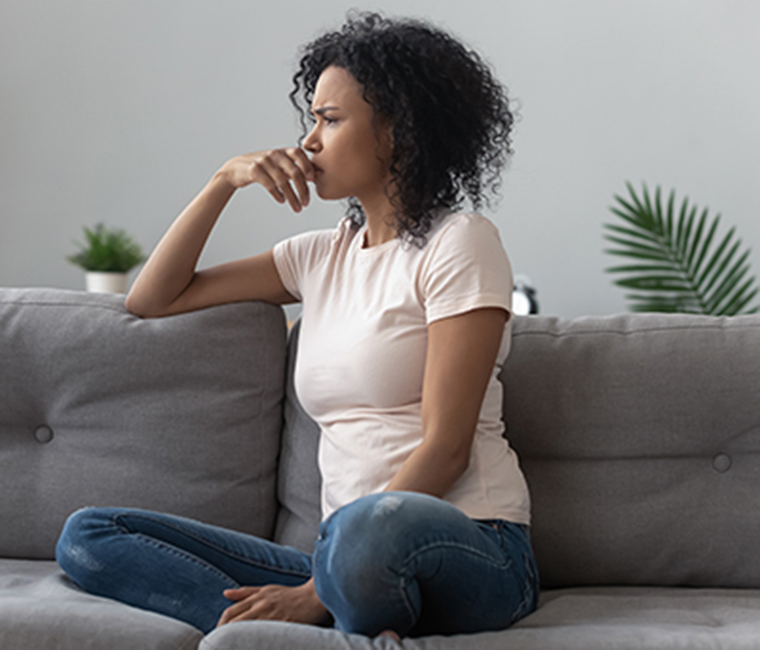Every month, about one week before your period starts, your mood changes drastically. You are angry for no reason, anxious, depressed and feel out of control. This is not your typical premenstrual syndrome (PMS), but what is it?
Most women know what PMS is, but there is another disorder associated with a woman’s menstrual cycle that can severely affect her life every month.
Washington University Physician, Eric Strand, MD, a specialist in obstetrics and gynecology explains, “Premenstrual dysphoric disorder (PMDD) is a health problem that is similar to premenstrual syndrome (PMS) but can be more serious. PMDD causes severe mood swings, irritability, depression, a sense of hopelessness, anxiety, or feeling overwhelmed or out of control in the week or two before your period starts.”
We do not have a good understanding of why some patients experience these symptoms and others do not. Studies have shown that hormone levels in patients (progesterone, estrogen) are unlikely to be the cause, but individual patients might have an abnormal response to otherwise normal cyclic hormone changes.
Studies have also shown that patients with PMS/PMDD may have lower serotonin levels (a brain chemical thought to play an important role in regulating mood). Serotonin levels change throughout the menstrual cycle and some women may be more sensitive to these changes.
HOW DOES PMMD DIFFER FROM PMS?
It is common for many women of child-bearing age to experience mild symptoms around their menstrual period — for instance, one to two days of mild bloating or breast tenderness. This is not considered PMS or PMMD.
Typical PMS symptoms include a variety of recurrent physical, emotional or behavioral symptoms that can cause impairment in typical day-to-day activities. These symptoms usually start in the second half of the menstrual cycle and end shortly after the start of the menstrual period. The symptoms may include bloating, headache, breast pain, anxiety, depression or irritability.
PMDD is often considered a more severe form of PMS.
For someone to be diagnosed with PMDD, a patient must have at least five symptoms — a combination of PMS symptoms and at least one mood-related symptom including:
- Severe mood swings
- Irritability
- Depression
- Sense of hopelessness
- Anxiety
- Feeling overwhelmed
- Feeling out of control
- Panic attacks
- Trouble sleeping
Dr. Strand explains, “Because mild symptoms are common, many patients are often labeled as having PMS or PMDD without actually fitting the diagnostic criteria. Using the criteria above—especially remembering to focus on the fact that the symptoms need to be cyclic with the menstrual cycle AND cause significant interference with various aspects of a patient’s life (relationships, work, etc.)—the incidence of women with PMS is about 5-10% and women with PMDD is about 2%.
Providers will often ask patients to keep a symptom diary for several months to better determine how well the symptoms truly correlate with the menstrual cycle.”
TREATMENT
Dr. Strand says, “While vitamin supplements are often recommended for treatment of PMDD, the data shows that most supplements are not very effective in relieving symptoms.
For women with mild symptoms of PMS, regular exercise and relaxation can be helpful.
For women with severe PMDD and who desire contraception, oral contraceptive pills (OCPs) are often helpful—these suppress the cyclic hormonal changes that occur during the normal menstrual cycle. In particular, OCP’s containing drospirenone (a type of progesterone) appear to be especially helpful.
For patients who do not want contraception (or who are content with their current form of birth control), selective serotonin reuptake inhibitors (SSRIs) have been effective in treating PMDD and PMS. These can be taken continuously or during the second half of the menstrual cycle.”
For more information, or to make an appointment with Dr. Strand or any of his colleagues, please call 314-362-4211.
Barnes-Jewish Center for Outpatient Health
4901 Forest Park Avenue, Suite 710
St. Louis, MO 63108
